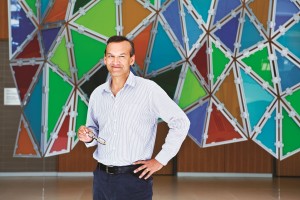Major Players in Global Fight Against Cancer Joining Forces at Toronto Conference
March 1/2018
By: Daniel Girard (University Health Network) & Leslie Shephard (St. Michael’s Hospital)
Some 300 delegates from more than 30 countries with one goal – joining in the global fight against cancer – met in Toronto today at the Toronto Global Cancer Control Conference, co-chaired by Professor Prabhat Jha. The conference will run from today through Saturday and feature an all-star line-up of international leaders in cancer care and global health.
On the agenda are a wide range of topics from opportunities to accelerate progress in cancer control and clinical delivery, to research and innovation, health-care economics and narrowing the gap in diagnosis, treatment and survival rates between cancer patients in high-income and low and middle-income countries.
Dr. Jha, who holds a Dalla Lana Chair in Global Health and Epidemiology, said one of the key themes of the conference will be recognition that “there’s a big global problem” in the rising death tolls from cancer. In high-income countries, two-thirds of those diagnosed with cancer survive their diagnosis. In low and middle-income countries, only one-third do.
Read more about the Toronto Global Cancer Control Conference
“Not only is there a need to increase survival rates in developing countries through cost-effective diagnosis and more accessible treatment, but also to make advances in cancer therapies more affordable to bridge the “cancer divide” that exists in all health-care systems, including Canada’s,” said Jha, founding Director of the Centre for Global Health Research, which is co-sponsored by the University of Toronto and by St. Michael’s Hospital.
“There is concern about a widening cancer divide because new therapies will not necessarily be accessible, even in places like Canada,” Jha said. “That situation is amplified in developing countries.”
Conference co-chair Dr. Mary Gospodarowicz, medical director at the Princess Margaret Cancer Centre, said “knowledge is produced globally, not just locally.”
“Bringing together major players in global cancer care and learning about what they are doing and what they are discussing offers us access to more possible solutions for our challenges,” she said. “It’s too narrow to say we can fix everything here ourselves, because if so, we would have by now.”
Among the internationally renowned keynote speakers at the conference are:
- Sir George Alleyne, director emeritus of the Pan-American Health Organization and the former United Nations Secretary-General’s envoy for HIV/Aids in the Caribbean;
- Julio Frenk, a Mexican physician, scholar and leader in global public health who is president of the University of Miami and former dean of the Harvard University T.H. Chan School of Public Health;
- Sir Michael Marmot, who pioneered research into health inequalities and was chair of the Commission on Social Determinants of Health set up by the World Health Organization in 2005;
- Dr. Felicia Knaul, the conference’s international co-chair, who is a health economist, world expert on Latin American health systems, health equity scientist, cancer survivor and chair of the Lancet Commission on Global Access to Palliative Care and Pain Relief.
The subtitle of the conference is “Creating the Future” and organizers have asked each speaker to discuss potential solutions in his or her areas of expertise. It’s also hoped that the event will help engage students and young faculty members in the global cancer agenda.

